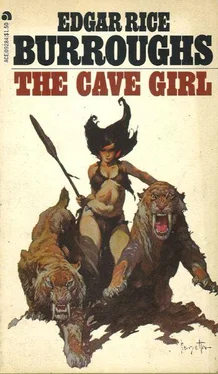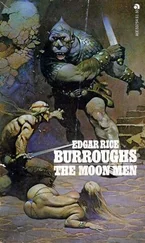Edgar Burroughs - The Cave Girl
Здесь есть возможность читать онлайн «Edgar Burroughs - The Cave Girl» весь текст электронной книги совершенно бесплатно (целиком полную версию без сокращений). В некоторых случаях можно слушать аудио, скачать через торрент в формате fb2 и присутствует краткое содержание. Жанр: Боевая фантастика, на английском языке. Описание произведения, (предисловие) а так же отзывы посетителей доступны на портале библиотеки ЛибКат.
- Название:The Cave Girl
- Автор:
- Жанр:
- Год:неизвестен
- ISBN:нет данных
- Рейтинг книги:5 / 5. Голосов: 1
-
Избранное:Добавить в избранное
- Отзывы:
-
Ваша оценка:
- 100
- 1
- 2
- 3
- 4
- 5
The Cave Girl: краткое содержание, описание и аннотация
Предлагаем к чтению аннотацию, описание, краткое содержание или предисловие (зависит от того, что написал сам автор книги «The Cave Girl»). Если вы не нашли необходимую информацию о книге — напишите в комментариях, мы постараемся отыскать её.
The Cave Girl — читать онлайн бесплатно полную книгу (весь текст) целиком
Ниже представлен текст книги, разбитый по страницам. Система сохранения места последней прочитанной страницы, позволяет с удобством читать онлайн бесплатно книгу «The Cave Girl», без необходимости каждый раз заново искать на чём Вы остановились. Поставьте закладку, и сможете в любой момент перейти на страницу, на которой закончили чтение.
Интервал:
Закладка:
Edgar Rice Burroughs
The Cave Girl
The Cave Girl
1
Flotsam
The dim shadow of the thing was but a blur against the dim shadows of the wood behind it. The young man could distinguish no outline that might mark the presence as either brute or human. He could see no eyes, yet he knew that somewhere from out of that noiseless mass stealthy eyes were fixed upon him. This was the fourth time that the thing had crept from out the wood as darkness was settling—the fourth time during those three horrible weeks since he had been cast upon that lonely shore that he had watched, terror-stricken, while night engulfed the shadowy form that lurked at the forest’s edge.
It had never attacked him, but to his distorted imagination it seemed to slink closer and closer as night fell—waiting, always waiting for the moment that it might find him unprepared.
Waldo Emerson Smith-Jones was not overly courageous. He had been reared among surroundings of culture plus and ultra-intellectuality in the exclusive Back Bay home of his ancestors. He had been taught to look with contempt upon all that savored of muscular superiority—such things were gross, brutal, primitive. It had been a giant intellect only that he had craved—he and a fond mother—and their wishes had been fulfilled. At twenty-one Waldo was an animated encyclopedia—and about as muscular as a real one. Now he slunk shivering with fright at the very edge of the beach, as far from the grim forest as he could get. Cold sweat broke from every pore of his long, lank, six-foot-two body. His skinny arms and legs trembled as with palsy. Occasionally he coughed—it had been the cough that had banished him upon this ill-starred sea voyage. As he crouched in the sand, staring with wide, horror-dilated eyes into the black night, great tears rolled down his thin, white cheeks.
It was with difficulty that he restrained an overpowering desire to shriek. His mind was filled with forlorn regrets that he had not remained at home to meet the wasting death that the doctor had predicted—a peaceful death at least—not the brutal end which faced him now.
The lazy swell of the South Pacific lapped his legs, stretched upon the sand, for he had retreated before that menacing shadow as far as the ocean would permit. As the slow minutes dragged into age-long hours, the nervous strain told so heavily upon the weak boy that toward midnight he lapsed into merciful unconsciousness.
The warm sun awoke him the following morning, but it brought with it but a faint renewal of courage. Things could not creep to his side unseen now, but still they could come, for the sun would not protect him. Even now some savage beast might be lurking just within the forest. The thought unnerved him to such an extent that he dared not venture to the woods for the fruit that had formed the major portion of his sustenance. Along the beach he picked up a few mouthfuls of sea-food, but that was all.
The day passed, as had the other terrible days which had preceded it, in scanning alternately the ocean and the forest’s edge—the one for a ship and the other for the cruel death which he momentarily expected to see stalk out of the dreary shades to claim him.
A more practical and a braver man would have constructed some manner of shelter in which he might have spent his nights in comparative safety and comfort, but Waldo Emerson’s education had been conducted along lines of undiluted intellectuality—pursuits and knowledge which were practical were commonplace, and commonplaces were vulgar. It was preposterous that a Smith-Jones should ever have need of vulgar knowledge.
For the twenty-second time since the great wave had washed him from the steamer’s deck and hurled him, choking and sputtering, upon this inhospitable shore, Waldo Emerson saw the sun sinking rapidly toward the western horizon. As it descended the young man’s terror increased, and he kept his eyes glued upon the spot from which the shadow had emerged the previous evening. He felt that he could not endure another night of the torture he had passed through four times before. That he should go mad he was positive, and he commenced to tremble and whimper even while daylight yet remained. For a time he tried turning his back to the forest, and then he sat huddled up gazing out upon the ocean; but the tears which rolled down his cheeks so blurred his eyes that he saw nothing.
Finally he could endure it no longer, and with a sudden gasp of horror he wheeled toward the wood. There was nothing visible, yet he broke down and sobbed like a child, for loneliness and terror.
When he was able to control his tears for a moment he took the opportunity to scan the deepening shadows once more. The first glance brought a piercing shriek from his white lips.
The thing was there!
The young man did not fall groveling to the sand this time—instead, he stood staring with protruding eyes at the vague form, while shriek after shriek broke from his grinning lips.
Reason was tottering.
The thing, whatever it was, halted at the first blood-curdling cry, and then when the cries continued it slunk back toward the wood.
With what remained of his ebbing mentality Waldo Emerson realized that it were better to die at once than face the awful fears of the black night. He would rush to meet his fate, and thus end this awful agony of suspense.
With the thought came action, so that, still shrieking, he rushed headlong toward the thing at the wood’s rim. As he ran it turned and fled into the forest, and after it went Waldo Emerson, his long, skinny legs carrying his emaciated body in great leaps and bounds through the tearing underbrush.
He emitted shriek after shriek—ear-piercing shrieks that ended in long drawn out wails, more wolfish than human. And the thing that fled through the night before him was shrieking, too, now.
Time and again the young man stumbled and fell. Thorns and brambles tore his clothing and his soft flesh. Blood smeared him from head to feet. Yet on and on he rushed through the semi-darkness of the now moonlit forest.
At first impelled by the mad desire to embrace death and wrest the peace of oblivion from its cruel clutch, Waldo Emerson had come to pursue the screaming shadow before him from an entirely different motive. Now it was for companionship. He screamed now because of a fear that the thing would elude him and that he should be left alone in the depth of this weird wood. Slowly but surely it was drawing away from him, and as Waldo Emerson realized the fact he redoubled his efforts to overtake it. He had stopped screaming now, for the strain of his physical exertion found his weak lungs barely adequate to the needs of his gasping respiration.
Suddenly the pursuit emerged from the forest to cross a little moonlit clearing, at the opposite side of which towered a high and rocky cliff. Toward this the fleeing creature sped, and in an instant more was swallowed, apparently, by the face of the cliff.
Its disappearance was as mysterious and awesome as its identity had been, and left the young man in blank despair. With the object of pursuit gone, the reaction came, and Waldo Emerson sank trembling and exhausted at the foot of the cliff. A paroxysm of coughing seized him, and thus he lay in an agony of apprehension, fright, and misery until from very weakness he sank into a deep sleep.
It was daylight when he awoke—stiff, lame, sore, hungry, and miserable—but, withal, refreshed and sane. His first consideration was prompted by the craving of a starved stomach; yet it was with the utmost difficulty that he urged his cowardly brain to direct his steps toward the forest, where hung fruit in abundance.
At every little noise he halted in tense silence, poised to flee. His knees trembled so violently that they knocked together; but at length he entered the dim shadows, and presently was gorging himself with ripe fruits.
Читать дальшеИнтервал:
Закладка:
Похожие книги на «The Cave Girl»
Представляем Вашему вниманию похожие книги на «The Cave Girl» списком для выбора. Мы отобрали схожую по названию и смыслу литературу в надежде предоставить читателям больше вариантов отыскать новые, интересные, ещё непрочитанные произведения.
Обсуждение, отзывы о книге «The Cave Girl» и просто собственные мнения читателей. Оставьте ваши комментарии, напишите, что Вы думаете о произведении, его смысле или главных героях. Укажите что конкретно понравилось, а что нет, и почему Вы так считаете.








